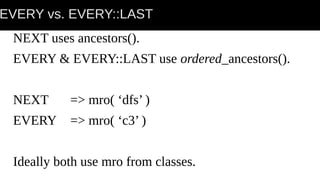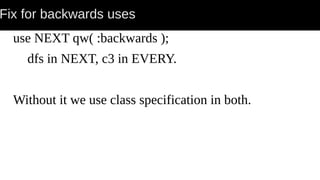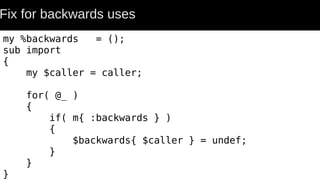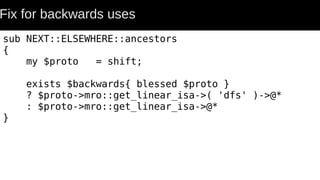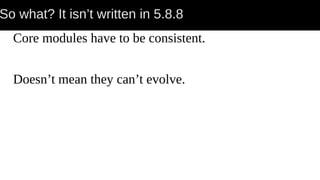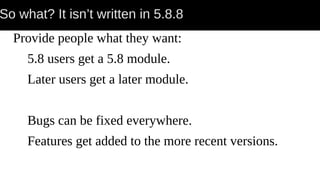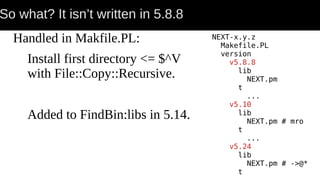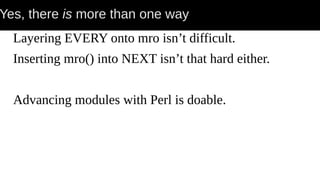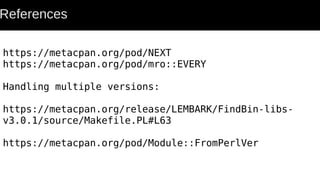The document discusses the evolution of object-oriented programming (OOP) in Perl, particularly focusing on the method resolution order (MRO) and its advancements over the years. It highlights the flexibility of Perl's OOP, including features like destructor and constructor chaining, autoloading, and the implementation of mro::every for improved method lookup and dispatch. Additionally, the text explains potential pitfalls and strategies for effective method redispatching and managing autoload in complex class hierarchies.
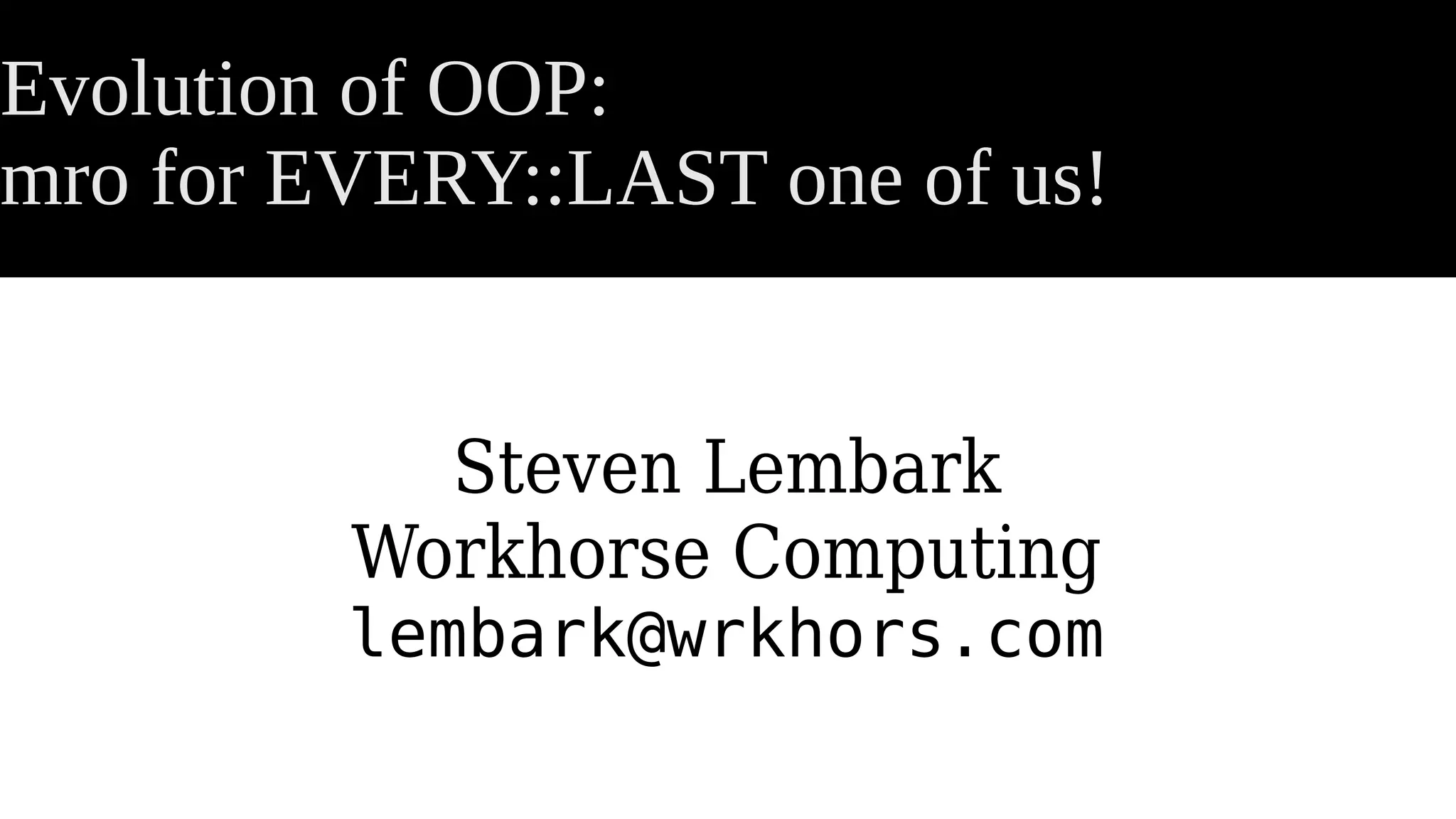
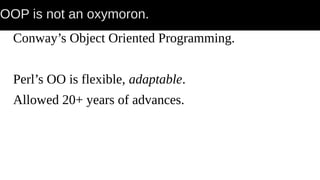
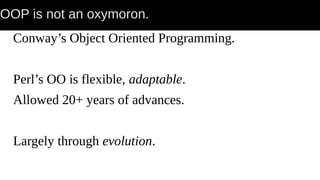
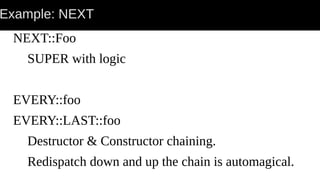
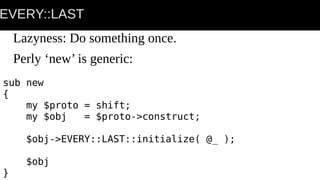
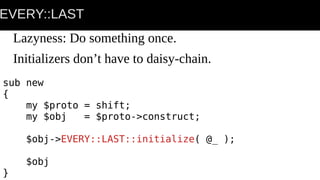
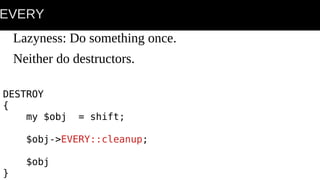
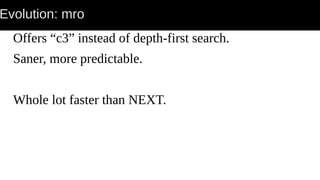
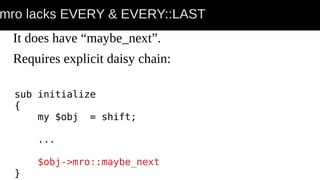

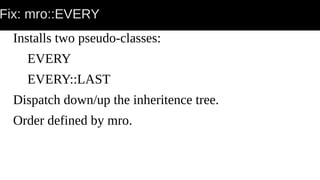
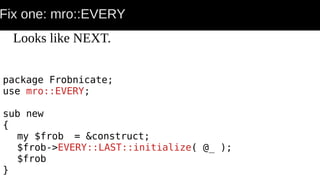
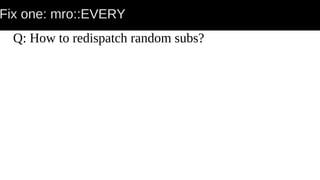
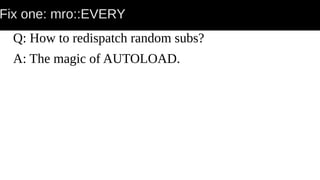
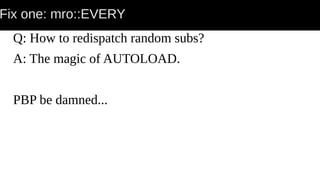
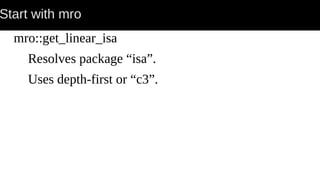
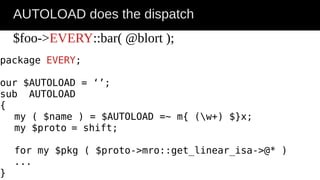
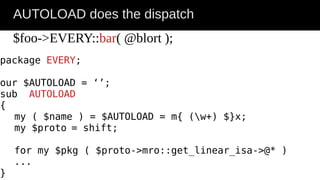
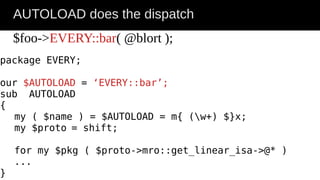
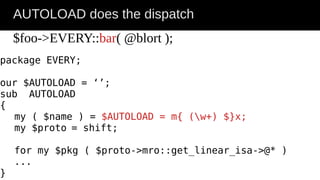
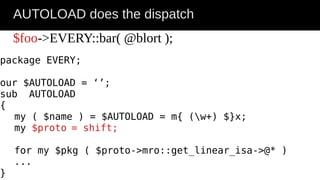
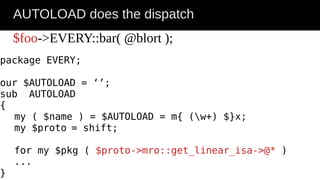
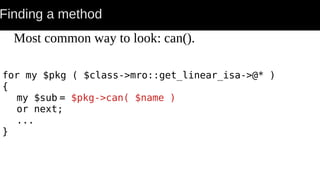
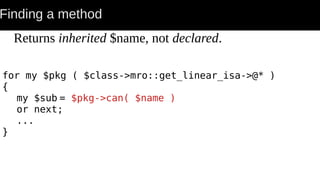
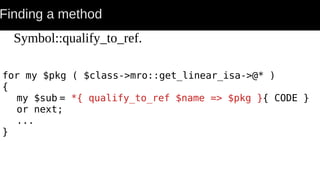
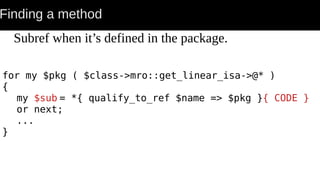
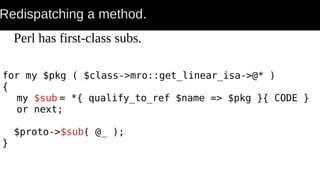
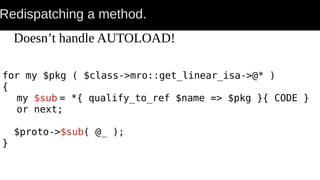
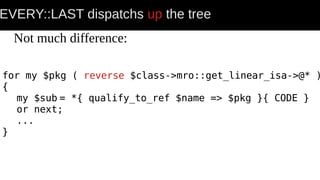
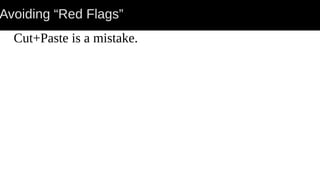
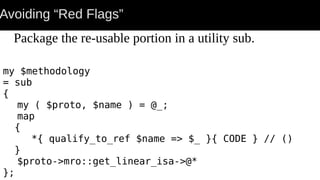
![Avoiding “Red Flags”
package EVERY;
our $AUTOLOAD = ‘’;
sub AUTOLOAD
{
my $proto = shift;
my $name = ( split ‘::’, $AUTOLOAD )[-1];
$proto->$_( @_ )
for uniq $methodology->($proto, $name)
}
List of subs in mro-order.](https://image.slidesharecdn.com/mro-every-220719020914-f49bf225/85/mro-every-pdf-32-320.jpg)
![Avoiding “Red Flags”
package EVERY::LAST;
our $AUTOLOAD = ‘’;
sub AUTOLOAD
{
my $proto = shift;
my $name = ( split ‘::’, $AUTOLOAD )[-1];
$proto->$_( @_ )
for uniq reverse $methodology->($proto, $name)
}
Reverse the order for Every::Last](https://image.slidesharecdn.com/mro-every-220719020914-f49bf225/85/mro-every-pdf-33-320.jpg)
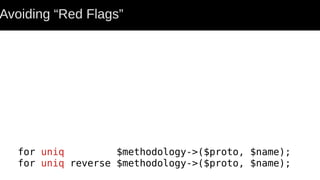
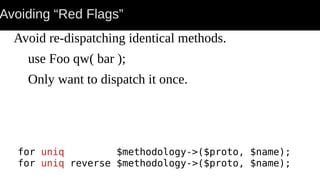
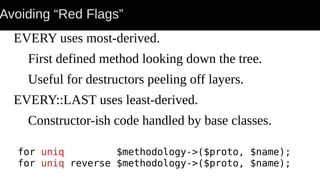
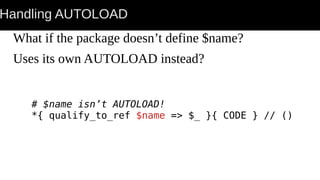
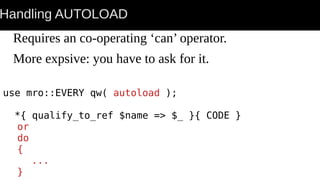
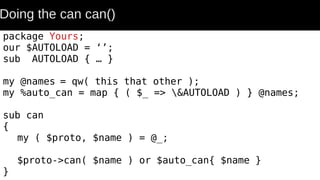
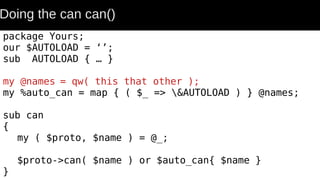
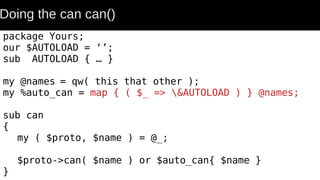
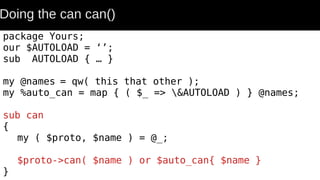
![map
{
*{ qualify_to_ref $name, $_ }{CODE}
or do
{
local *{qualify_to_ref ISA => $_} = [];
$_->can( $name )
? $name
: ()
}
}
$proto->mro::get_linear_isa->@*;
Dispatching AUTOLOAD](https://image.slidesharecdn.com/mro-every-220719020914-f49bf225/85/mro-every-pdf-43-320.jpg)
![map
{
*{ qualify_to_ref $name, $_ }{CODE}
or do
{
local *{qualify_to_ref ISA => $_} = [];
$_->can( $name )
? $name
: ()
}
}
$proto->mro::get_linear_isa->@*;
Dispatching AUTOLOAD](https://image.slidesharecdn.com/mro-every-220719020914-f49bf225/85/mro-every-pdf-44-320.jpg)
![map
{
*{ qualify_to_ref $name, $_ }{CODE}
or do
{
local *{qualify_to_ref ISA => $_} = [];
$_->can( $name )
? $name
: ()
}
}
$proto->mro::get_linear_isa->@*;
Dispatching AUTOLOAD](https://image.slidesharecdn.com/mro-every-220719020914-f49bf225/85/mro-every-pdf-45-320.jpg)
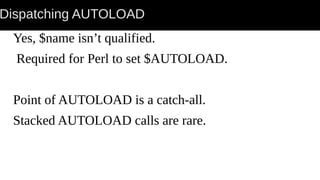
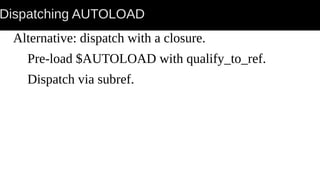
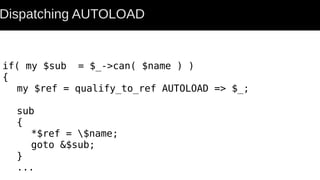
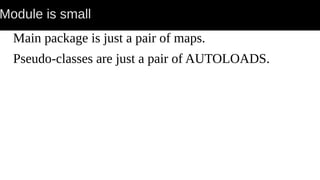


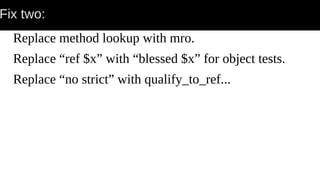
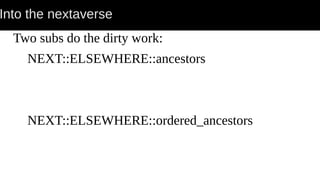
![Into the nextaverse
Two subs do the dirty work:
NEXT::ELSEWHERE::ancestors
Depth-first-search in Pure Perl.
NEXT::ELSEWHERE::ordered_ancestors
c3[ish] in Pure Perl.](https://image.slidesharecdn.com/mro-every-220719020914-f49bf225/85/mro-every-pdf-54-320.jpg)
![DFS in Pure Perl
Iterate @ISA chains with symbolic refs.
sub NEXT::ELSEWHERE::ancestors
{
my @inlist = shift;
my @outlist = ();
while (my $next = shift @inlist) {
push @outlist, $next;
no strict 'refs';
unshift @inlist, @{"$outlist[-1]::ISA"};
}
return @outlist;
}](https://image.slidesharecdn.com/mro-every-220719020914-f49bf225/85/mro-every-pdf-55-320.jpg)
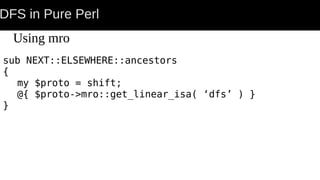
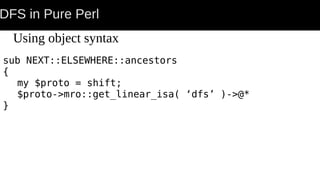
![Purly Perly c3[ish]
sub NEXT::ELSEWHERE::ordered_ancestors
{
my @inlist = shift;
my @outlist = ();
while (my $next = shift @inlist) {
push @outlist, $next;
no strict 'refs';
push @inlist, @{"$outlist[-1]::ISA"};
}
return sort { $a->isa($b) ? -1
: $b->isa($a) ? +1
: 0 } @outlist;
}](https://image.slidesharecdn.com/mro-every-220719020914-f49bf225/85/mro-every-pdf-58-320.jpg)
![Purly Perly c3[ish]
sub NEXT::ELSEWHERE::ordered_ancestors
{
my $proto = shift;
$proto->mro::get_linear_isa->( ‘c3’ )->@*
}](https://image.slidesharecdn.com/mro-every-220719020914-f49bf225/85/mro-every-pdf-59-320.jpg)
![Purly Perly c3[ish]
sub NEXT::ELSEWHERE::ordered_ancestors
{
my $proto = shift;
$proto->mro::get_linear_isa->( ‘c3’ )->@*
}
Well, Almost:
OA sorts depth-first, then left-most.
C3 sorts left-most, then depth-first.
Both constrain derived classes to precede base classes.](https://image.slidesharecdn.com/mro-every-220719020914-f49bf225/85/mro-every-pdf-60-320.jpg)
